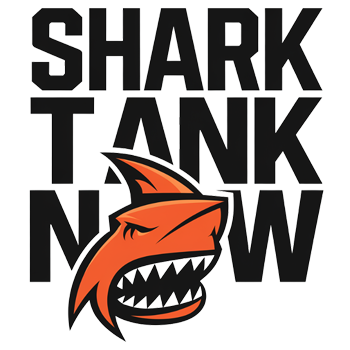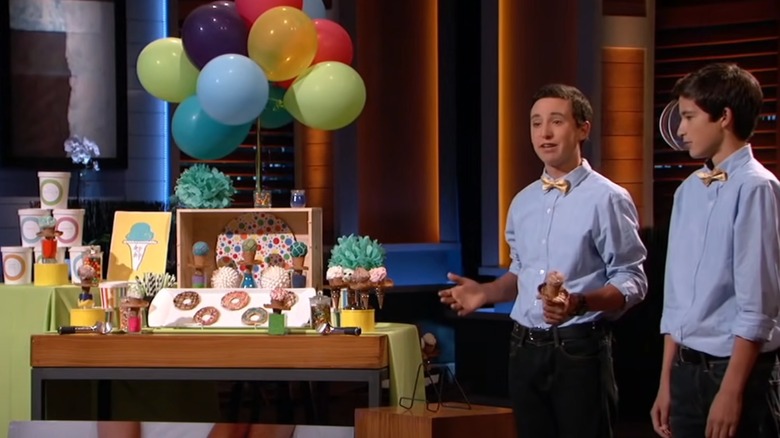There’s something universally nostalgic about ice cream cones—the creamy sweetness, the crunch of the cone, and unfortunately, the sticky drips that inevitably find their way onto your hands. For two Colorado teenagers, Oliver Greenwald and Sam Nassif, this messy problem sparked an ingenious solution: The Drip Drop, an edible ring designed to catch those pesky drips. Their journey from a fifth-grade invention competition to the bright lights of Shark Tank is as inspiring as it is educational for aspiring entrepreneurs. Let’s dive into the story of The Drip Drop—its rise, its challenges, and where it stands today.
From Fifth-Grade Idea to Shark Tank Spotlight
The story of The Drip Drop began in 2011 when Oliver and Sam were just 10 years old. As part of the Gates Invention & Innovation Competition, they were tasked with solving a common problem. Their inspiration came from a visit to a local ice cream parlor, where they noticed children struggling with melting ice cream cones. This “lightbulb moment” led them to design a tray-like edible sleeve that fits snugly around an ice cream cone to catch drips.
After countless iterations using toaster ovens and silicone molds, they perfected their product—a waffle-cone-based ring available in two flavors: original and chocolate. Their invention earned them funding for a design patent in 2012, making them the youngest competitors to achieve such recognition in the competition’s history.
Fast forward to 2016, Oliver and Sam—now high school freshmen—took their patented product to Shark Tank during Season 7, Episode 25. At just 15 years old, they became the youngest entrepreneurs to appear on the show without parental accompaniment.
The Shark Tank Pitch
The duo entered the Tank seeking $50,000 in exchange for 20% equity in their company, valuing it at $250,000. Armed with charm and confidence, they presented their edible drip catcher while handing out ice cream cones equipped with The Drip Drop to the Sharks. Their pitch was equal parts professional and endearing.
Oliver humorously declared, “We might not have driver’s licenses, but we have a patent,” earning laughs from both the Sharks and the audience. The Sharks were impressed by their youthful ambition and their ability to secure a design patent at such a young age. However, opinions on the product’s marketability were divided:
- Mark Cuban admired their effort but felt scaling the business would require too much work. He suggested starting small with local shops but ultimately bowed out.
- Robert Herjavec believed licensing was the right approach but thought it was too early for an investment.
- Kevin O’Leary praised their patent but echoed concerns about scalability.
- Lori Greiner passed on investing due to doubts about its market potential.
Despite these reservations, Barbara Corcoran stepped up with an offer: $50,000 for 33.3% equity, contingent upon improving the product’s design and quality. After a brief huddle, Oliver and Sam accepted her offer.
What Happened After Shark Tank?
While Barbara’s investment seemed like a dream come true for the young entrepreneurs, the deal ultimately fell through after filming. The reasons remain undisclosed but likely stemmed from financial constraints and challenges in meeting Barbara’s conditions for improving the product.
Undeterred, Oliver and Sam continued working on The Drip Drop. In 2018, they launched a Kickstarter campaign that raised $7,047 from 82 backers. This funding allowed them to refine their design further and produce small batches of their product. By summer 2019, The Drip Drop was available in three Denver-area ice cream shops as part of a pilot program.
However, scaling production proved difficult without significant capital or licensing deals with major manufacturers like Joy Cone. Around this time, Oliver stepped away from the business to pursue other ventures, leaving Sam as the sole operator of The Drip Drop.
Challenges That Stalled Growth
Despite initial success and widespread interest following their Shark Tank appearance (including inquiries from over 500 businesses), The Drip Drop faced several hurdles:
- Financial Constraints: Limited funding made it challenging to scale production or invest in marketing.
- Licensing Difficulties: While licensing was their primary goal, securing deals with large manufacturers proved elusive due to lack of established sales.
- Market Readiness: Feedback from Barbara Corcoran highlighted design flaws that needed addressing before mass production.
- Resource Limitations: As high school students juggling academics and entrepreneurship, Oliver and Sam lacked the time and resources needed to grow their business effectively.
By late 2019, The Drip Drop ceased operations entirely. Its website went offline, social media accounts became inactive, and no further updates were provided.
Data-Rich Overview
Here’s a detailed breakdown of The Drip Drop’s journey:
| Category | Details |
|---|---|
| Product Name | The Drip Drop |
| Founders | Oliver Greenwald and Sam Nassif |
| Season & Episode | Season 7, Episode 25 |
| Ask (Investment & Equity) | $50,000 for 20% equity |
| Final Deal | $50,000 for 33.3% equity (deal fell through) |
| Shark(s) Involved | Barbara Corcoran |
| Memorable Episode Moments | “We might not have driver’s licenses, but we have a patent.” |
| Current Net Worth | Not available |
| Current Business Status | Inactive |
| Revenue Since Shark Tank | Limited sales; approximately $7,000 raised via Kickstarter |
| Social Media Presence | Inactive since mid-2019 |
| Key Achievements | Secured design patent; Kickstarter campaign funded product improvements |
Lessons Learned
The story of The Drip Drop offers valuable insights for entrepreneurs:
- Market Readiness is Key: Even great ideas need refinement before they can succeed commercially.
- Financial Planning Matters: Securing sufficient capital is crucial for scaling production and marketing efforts.
- Timing is Everything: Entering a competitive market too early can hinder growth opportunities.
- Resilience Pays Off: Despite setbacks, Oliver and Sam gained invaluable experience that will serve them well in future ventures.
Where Are They Now?
As of January 2025, both founders have moved on to new pursuits:
- Oliver Greenwald developed an app called Make Shit Happen, which encourages users to complete small social change tasks during idle moments.
- Sam Nassif remains listed as CEO of The Drip Drop on his LinkedIn profile but has not reported any recent activity related to the business.
While The Drip Drop may no longer be active, its legacy endures as an inspiring example of youthful ingenuity and entrepreneurial spirit.
Final Thoughts
The Drip Drop was more than just an edible ice cream accessory—it was a bold attempt by two teenagers to solve a universal problem creatively. Although it didn’t achieve long-term success, its journey offers valuable lessons about perseverance, innovation, and adaptability in business.
For aspiring entrepreneurs reading this story: remember that every venture—successful or not—is an opportunity to learn and grow. Who knows? Your next big idea might just be one scoop away!

